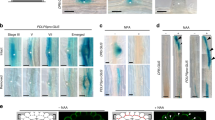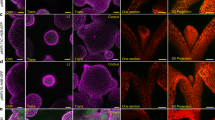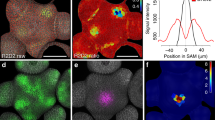Abstract
IT has been shown with isolated stem sections bearing a single bud that the development of this bud can be inhibited by indolyl-3-acetic acid (IAA) or other auxins, and this inhibition released by kinetin1. The concentrations of IAA needed are physiological, and the whole phenomenon appears identical with that of normal apical dominance. Nevertheless, the question remains as to whether the same release can be obtained in the intact plant, that is, under conditions of apical dominance sensu stricto.
This is a preview of subscription content, access via your institution
Access options
Subscribe to this journal
Receive 51 print issues and online access
$199.00 per year
only $3.90 per issue
Buy this article
- Purchase on Springer Link
- Instant access to full article PDF
Prices may be subject to local taxes which are calculated during checkout
Similar content being viewed by others
References
Wickson, M., and Thimann, K. V., Physiol. Plantarum, 11, 621 (1958).
Mothes, K., Naturwiss., 47, 337 (1960).
Gunning, B., Nature, 199, 262 (1963).
Author information
Authors and Affiliations
Rights and permissions
About this article
Cite this article
SACHS, T., THIMANN, K. Release of Lateral Buds from Apical Dominance. Nature 201, 939–940 (1964). https://doi.org/10.1038/201939a0
Issue Date:
DOI: https://doi.org/10.1038/201939a0
This article is cited by
-
Arabidopsis Col/Ler and Ws/Ler hybrids and Hybrid Mimics produce seed yield heterosis through increased height, inflorescence branch and silique number
Planta (2020)
-
The effect of auxin and strigolactone on ATP/ADP isopentenyltransferase expression and the regulation of apical dominance in peach
Plant Cell Reports (2018)
-
Axillary bud outgrowth in herbaceous shoots: how do strigolactones fit into the picture?
Plant Molecular Biology (2010)
-
Axillary multiplication of Swertia chirayita (Roxb. Ex Fleming) H. Karst., a critically endangered medicinal herb of temperate Himalayas
In Vitro Cellular & Developmental Biology - Plant (2007)
-
Expression of the ipt Gene with the AGPase S1 Promoter in Tomato Results in Unbranched Roots and Delayed Leaf Senescence
Plant Growth Regulation (2005)
Comments
By submitting a comment you agree to abide by our Terms and Community Guidelines. If you find something abusive or that does not comply with our terms or guidelines please flag it as inappropriate.



